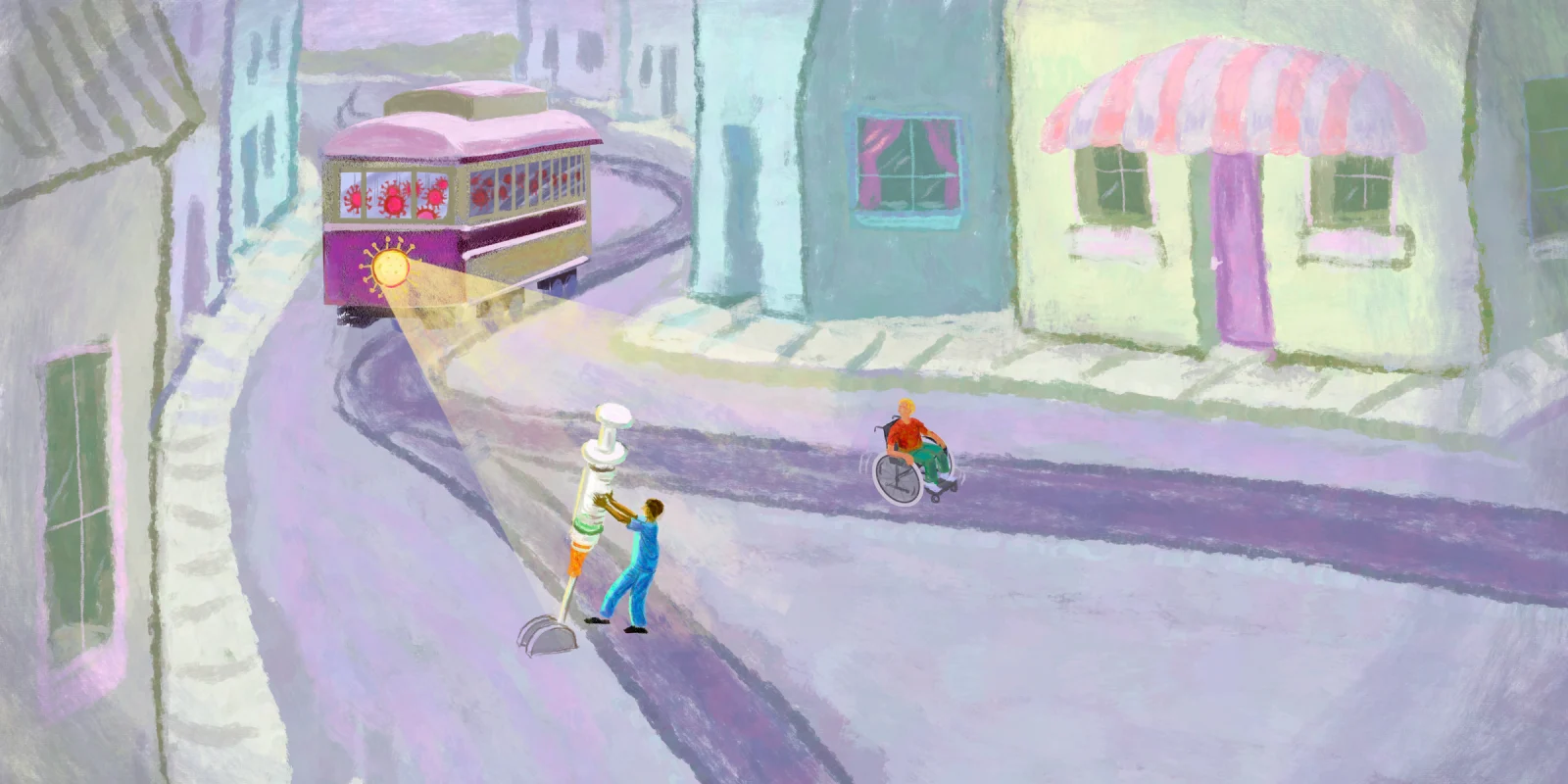I don’t think I have ever been excited about getting a shot. My parents used to have to drag me into the doctor’s office, kicking and screaming, when I knew a needle in the arm was coming. But recently, an email dropped in my inbox that directed me to sign up for a COVID-19 immunization series and I couldn’t have been happier. However, almost immediately after I scheduled my appointment, a new emotion surfaced: guilt.
Should I really qualify to be given this shot? I am a healthy, 28-year-old male with no risk factors. I am currently completing an MD/PhD degree and anticipate rejoining medical school clerkships at the beginning of the summer. My current research allows me to work from home, where I spend most of my days on my computer in a basement office. The email made clear that if I did not accept the invitation to be immunized, I would be placed in the public queue of people and subject to state and local guidelines. For me, as a young healthy person, I would be immunized last out of everyone in the state.
I was left with a personal decision: accept the invitation for a vaccine ahead of a group that needed it before I did, or deny the invitation and risk not receiving a vaccine until well into my clerkship year.
I started with the reasons to get a vaccine. As a third-year medical student, I personally believe the vaccine is a necessary protection to ensure safety for myself, my patients, and all the staff that I work with. The vaccine, even after only a single dose, has been shown to be an effective treatment for limiting spread and infection rates. Furthermore, many patients that I will see are at high risk and may or may not be able to get the vaccine. Herd immunity, in this context, is vital to protect the members of our communities and ensure they remain healthy, beyond simply helping ourselves. Large-scale vaccination efforts will significantly decrease community spread and protect people that cannot be immunized. I believe that participating in my third-year clinical duties without a vaccine would be an unacceptable risk to my own health, and the health of patients, staff, and families that I may meet. One point for getting immunized.
My second thought was, Who knows what will happen in three months? Some people say, “Brian, you will be fine. By the time you go back, three months from now, there will be plenty of vaccines and everyone will be happy.” While I deeply appreciate the optimism, the constant stream of information with dates that range from “mid-April” to “mid-October” do not inspire confidence. Another possibility could be the immunization supply chains become damaged and vaccine production is delayed. The likelihood and timing of those events are impossible to predict, but the significant demand from the entire world could stress supply chains and may cause production line failures. Based on my experience over the past year, absolutely anything could happen in three short months. Because things are so unclear, it’s also unclear how much of a pro-shot this is, so 0.5 points for getting immunized.
I then thought about the people I would be jumping in line, especially the older members of my community. I have read reports that many older community members have barricaded themselves in their houses and are suffering from isolation, and I have personally seen how they have protected themselves with grocery delivery and Netflix documentaries. I have been fortunate to spend time with some of these community members through virtual communication platforms. There is a deep sense of loneliness, isolation, fear, and fatigue. They are unable to do the things that they love, and in turn, wonder if life is worth continuing. A vaccine provided something much bigger and more important than just protection against a virus: it provided hope that maybe they could return to seeing their extended families, enjoying the presence of others, and living without constant fear of an invisible Grim Reaper. By getting the vaccine, I would push them farther back in the line. Minus one point.
Going further into my community, I thought about what I would say to my grandparents. They are all well into their 80s and have been following public health guidelines dutifully. As with old age, they have some significant risk factors, such as heart disease and other chronic illnesses. They have long been some of my biggest supporters, mentors, and coveted family members. Could I face them and tell them I got the vaccine before they did, even though I was a young and healthy person who works from home in a basement? They have not seen most of their children for almost a year. They have been unable to participate in group activities, have been isolated from their social network, and have been unable to do many things that they deeply enjoy. Of course, we are both missing things that we would love to still be able to do, but statistically, I have many years and many more chances to enjoy those things. For my grandparents, time is shorter, and life is entering its final chapter. What would they think about my decision to take an immunization over someone like them? Minus 0.5 points.
In the end, the scales were even, but I was still left with a decision to make. I stared at the computer screen. I was immensely grateful my institution had considered me an important enough member of the clinical team to offer protection. However, I felt the weight of other non-clinical community members not receiving this protection to literally stay alive. In the U.S., we do not often have to prioritize health care resources to one over another, with organ donation being the major exception. This COVID-19 experience has forced us to reconsider how we distribute health care resources, from PPE, to ventilation support throughout hospitals and the country, to vaccines. This latest prioritization issue of vaccination has spurred commentaries about the vaccination issue on social media, popular news outlets, and academic publications. Most have consistent recommendations about what is highly inappropriate, such as lying about your age or comorbidities, or changing your place of residence to another region where you would qualify for the vaccine. However, most of the recommendations and suggestions are obvious. It is situations like mine that are far more dubious and gray. The answer is not black and white, and will likely be interpreted differently depending on your background and life experience. For me, the key was to think about all the stakeholders involved and discuss my decision with different groups of people. I explained what I was feeling and the conflicting points. Discussing these decisions with other individuals opened my eyes to my point system and how adequate or inadequate the weighting was for different viewpoints. I believe that we, members of the health care community and members of our larger communities, should encourage this discussion and help others navigate these situations. As more people have the opportunity to be immunized, there will be more gray situations. Patience, understanding, and discussion will be key to navigating the uncharted territory of recovering from a worldwide pandemic.
If you have been offered the vaccine, what factors went into your pro/con list in deciding to receive or not receive it?
Brian Zenger has a BS in Biomedical Engineering and is a MD/PhD student in Biomedical Engineering at the University of Utah. In addition to his clinical and research responsibilities he is the founding volunteer coordinator and current director of the No One Dies Alone program at the University of Utah. He is an active member of the community serving as a volunteer and in multiple leadership positions. He is a 2020–2021 Doximity Op-Med Fellow.
Illustration by Jennifer Bogartz
Click here to see more perspectives on COVID-19 from the Doximity network.
Click here for up-to-date news about COVID-19 on Doximity.







